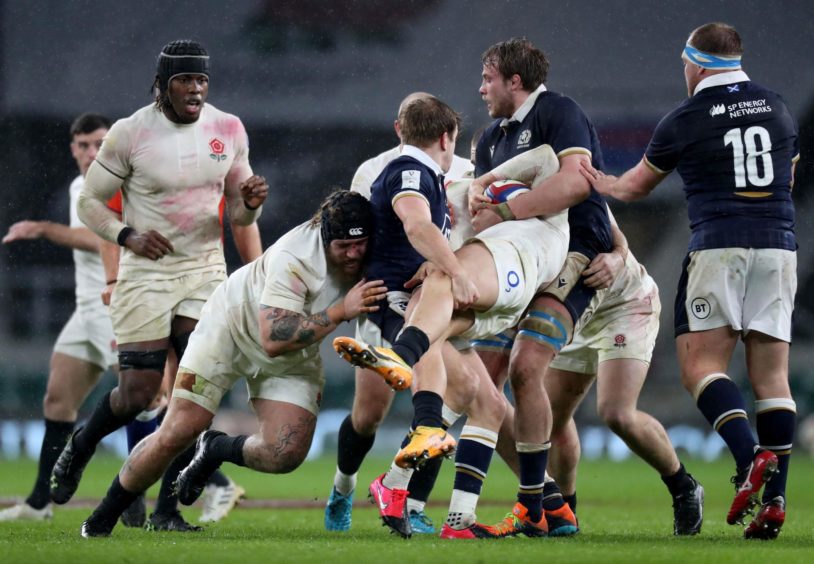For a significant proportion of Scotland’s supporters, Saturday’s historic 11-6 win over England at Twickenham completes the season before it’s even started.
There’s a natural tendency to put all our hopes into the Calcutta Cup match. Nearly four decades of failure at English rugby’s HQ ended as well, some can be forgiven for thinking that’s all we need for 2021.
But really, Saturday should just be the start of something. With three home games to come, the Six Nations Championship is a live possibility for Scotland for the first time since 1999.
The resilience and belief shown by Scotland on Saturday has to be the same for Wales, Ireland, France and Italy now. There’s a few pointers to suggest it will be.
Game management was a key
A man down just before half-time when in charge of the game – it was the same situation Scotland had in their last game in November.
Finn Russell’s yellow was more serious than Duncan Taylor’s in Dublin. Yet it was negotiated with just the three points conceded for the instinctive trip that brought the sanction.
Jonny Gray’s lineout steal got them through to half-time, but Scotland played out the entirety of the remaining time after the break in England’s half, and probably should have added to their narrow lead during that spell.
Beyond that, Scotland won the kicking game – little talk about “aimless” exchanges this time – and dominated the contestable ball in the air. England were frustrated and constantly penalised because they were so well corralled.
Defence remains the foundation
Scotland had conceded an AVERAGE of 38 points a game at Twickenham since 2001. They’d never held England tryless in that time.
There’s never been a better defensive performance by a Scotland side, surely. England had one serious possession inside the Scottish 22, which led to Russell’s trip and the yellow card.
They twice kicked penalties to the corner and then lost the lineout. Maro Itoje’s fingertips on a couple of charge downs of Ali Price box kicks were their only other touches in the red zone.
In the last ten minutes, when England rumbled forward in desperation as much as anything, they barely made ten metres of ground. After some blips in the autumn, Steve Tandy’s scheme was watertight again.
But Scotland ARE beginning to open out
One highlights package of the game I saw was brief, suggesting we had the same unimaginative fare of the autumn.
Weather conditions meant it was no festival of off-loads, but Scotland had a lot more about them with ball in hand. Finn Russell’s return had something to do with that, while Cameron Redpath’s balanced running is a second threat.
Duhan van der Merwe gets more ball for Scotland than he does for Edinburgh. Sean Maitland had a brilliant game considering how little he’s played in recent weeks.
England’s defence was one of the areas where they actually showed up. To counter it, Scotland kicked intelligently and effectively when the occasion demanded. There does appears to be a willingness to run when there’s space, as shown in the try they scored.
Jonny makes the jump
For years the book on Jonny Gray has been incomplete – incredible engine, wonderful workrate, never misses a tackle. But he never seemed to be in the same echelon as the true athletic locks of the modern game, Brodie Retallick, James Ryan, especially England’s Maro Itoje.
Saturday was the day he seemed to make the leap. He outplayed the (rightly) celebrated Itoje in direct opposition. Previously a solid lineout contributor, Gray’s steal just before half-time – when England were trying to set up a score to undeservedly lead with a man advantage – was absolutely crucial.
The few months at Exeter seem to have transformed Jonny. He was always a coach’s dream with 20 tackles and carries, but you never thought he could properly stamp himself on a game. On Saturday he did.
No crowd makes a huge difference
As in the win in Wales, the absence of spectators changed the game. The Twickenham crowd may be more fickle than the Welsh. You know they would have rallied their team at some point. England looked short of inspiration.
More than that, it’s clear – apparently the stats back it up – that refs aren’t “homers” when there’s no crowd. Andy Brace clearly called it as he saw it and had few disputable decisions.
But when did you last see a 15-6 penalty count against a home team?
A few little concerns
Finn Russell has never been a 90% goalkicker. Stuart Hogg’s radar is never that reliable with the long penalty attempts. Ultimately it didn’t matter on Saturday. But missed chances kept this from being the comfortable win the balance of play demanded.
Similarly, the white line fever is still there. You always felt the failure to take advantage of first half possession and territory would come back on Scotland. Thanks to their outstanding defence, it didn’t.
There were also little examples of the lack of composure that cost Scotland the game against France in November; the botched drop goal, Chris Harris kicking a clearance, Hogg and Russell once being too casual in retreat, Price’s lack of protection.
Small things, but no doubt they’ll be addressed before Wales.


